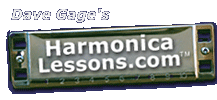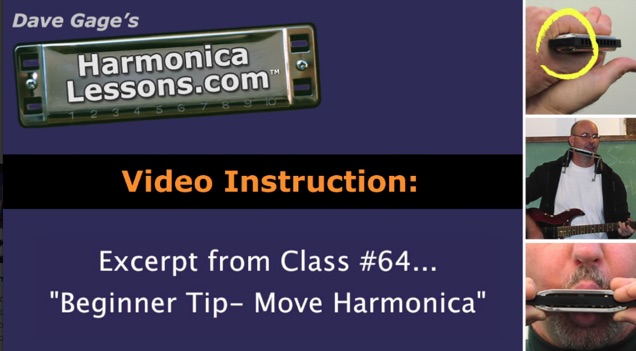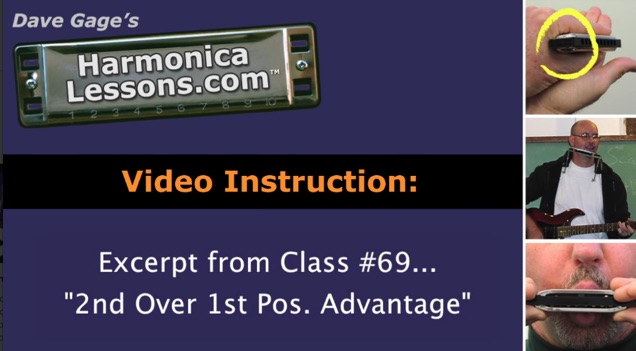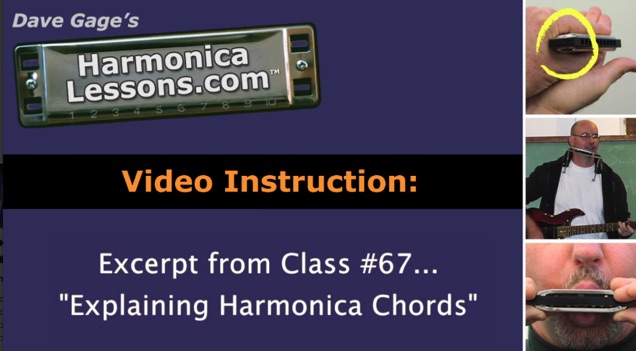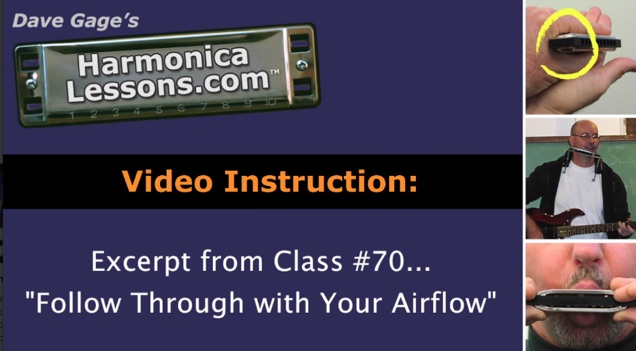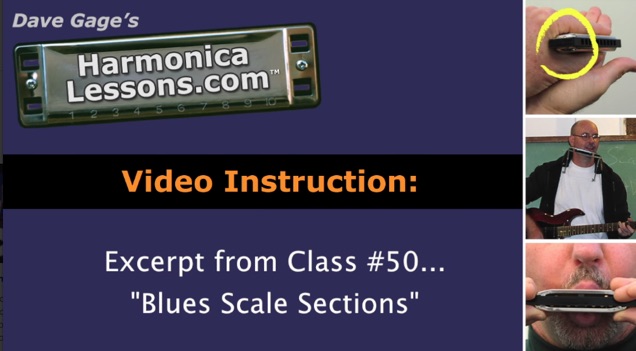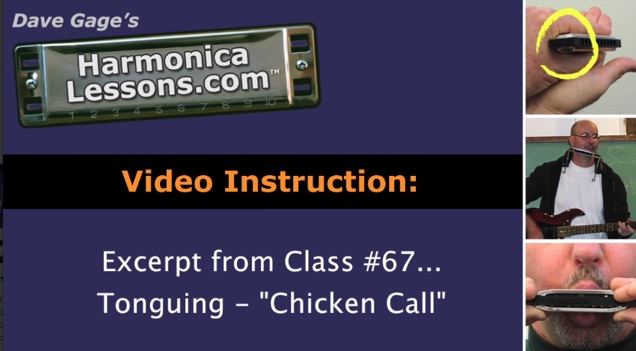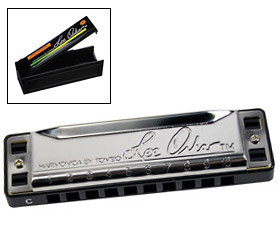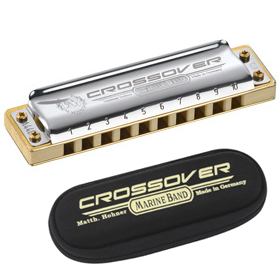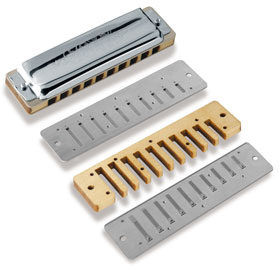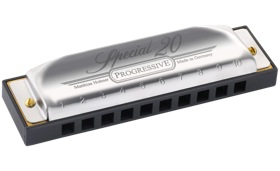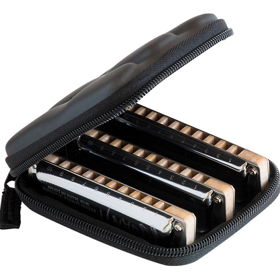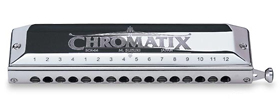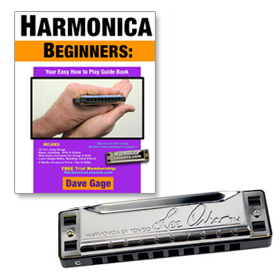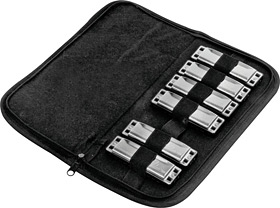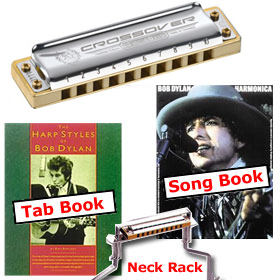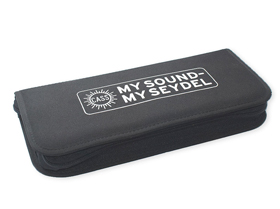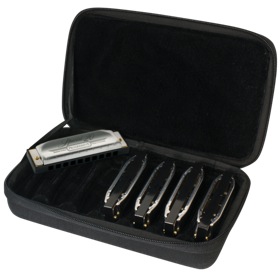FAQs: Harmonica Purchases
Here is a collection of Frequently Asked Questions (FAQ's) that may arise when buying harmonicas or related items. Take a look, you are likely to find your question(s) answered on this page or one of the blue-linked pages above.
- Which harmonica (brand) should I buy to follow the lessons on this site?
- Why do you recommend the harmonica be in the key of "C"? Don't the other keys play the same?
- Why should I buy a more expensive harmonica if I'm just starting out?
- Are wood harmonicas better than the plastic ones?
- Hohner makes a harmonica called a 'Blues Harp'. Is this better for playing blues than a standard diatonic harmonica like the Lee Oskar or Special 20?
- How do I use other key diatonic harmonicas after I learn to play the key of "C" harmonica?
- How can I go about getting the song sheets or harmonica tablature (numbers and arrows) so I can learn to play the harmonica licks on the blues albums I own?
- I don't want to buy all 12 key harmonicas at once. Which are the best ones to get first and in what order?
- What are the best keys of harmonicas for playing the blues?
- How long should a harmonica typically last before one of the reeds (notes) goes "bad" (i. e. flat) and I have to buy a new one?
- Which is the best microphone and amp combination for using on stage?
- I just got a harmonica holder. I'd like to be able to play while I'm playing guitar. But this thing feels so unnatural. Any tips on how to properly use a neck holder? Can I play cross harp or only straight harp? It seems that it pops out everytime I put any pressure on it.
- I have a friend who is blind and would like to learn the blues on the harmonica. Are there any audio tapes available that can instruct him on the notes and techniques to play the harmonica?
- I just purchased a harmonica that has no numbers on it. How do I play along with the arrow and number system that you use for songs and riffs?
- Which harmonica (brand) should I buy to follow the lessons on this site?
You'll need a good quality diatonic type harmonica to learn and practice on with hole numbers imprinted above each hole. The standard 10-hole diatonic harmonica is used for most blues, folk, rock, and country styles (of course you would need a standard chromatic harmonica if utilizing our chromatic harmonica instruction).
You can't go wrong with the Lee Oskar Major Diatonic or the Hohner Special 20 (preferably in the key of "C"), both are great for players just starting out.
The Hohner Marine Band Crossover and the Suzuki Manji Diatonic and the Seydel 1847 Classic are also excellent choices—a bit more pricey, but great quality, tone, and playability with a wood comb. (Can't decide? Pick one, and try another when you need to buy different key.) The Lee Oskar harmonicas also feature the 1st Position and 2nd Position keys printed on the ends for easy reference. See our Which Harmonica Do I Need? page for more suggestions and information.
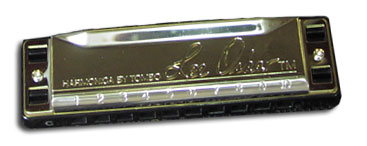
Recommended harmonica: Lee Oskar diatonic in the key of "C".
- Why do you recommend the harmonica be in the key of "C"? Don't the other key diatonics play the same?
Yes, the other key diatonics do play the same. What you learn on a key of "C" diatonic will be played exactly the same way on another key harmonica but it will come out in the new key. The reason we recommend the key of "C" is because it is the easiest key to obtain, it falls in the middle between the highest and lowest diatonic harmonicas (key of "G" being low and the key of "F" being high), and there are no flats or sharps in the key of "C" so the music theory is a bit easier.
- Why should I buy a more expensive harmonica if I'm just starting out?
Without store discounts, the best quality, most expensive diatonic harmonicas are around $35-$50. That is pretty cheap for a good quality instrument. Learning the harmonica, or anything else for that matter from scratch, can be very difficult and frustrating at times. Cheap harmonicas tend to be poorly constructed and therefore leak a lot of air. This means they are hard to play (for anyone, at any level). Pay the extra $10 or $20 and get a harmonica you can count on to play great right out of the box.
- Are wood harmonicas better than the plastic ones?
No. Quality wise it tends to be just the opposite. Most of the wood harmonicas leak too much air and are not recommended for beginners. In terms of the sound or tone, the choice between wood and plastic (or metal) combs comes down to personal preference.
Any reasonable quality harmonica in the hands of a good player will sound good.
Footnote- there are specialists out there that make or modify wood combs and they are quite nice although sometimes not cheap. Follow this link for a listing of some of these people (click on the white link "Repairs & Mods" in the header box).
- Hohner makes a harmonica called a 'Blues Harp'. Is this better for playing blues than a standard diatonic harmonica like the Lee Oskar or Special 20?
No. The 'Blues Harp' is just a name for a wood combed diatonic that is made by the Hohner Company. It is no better for playing blues than any other harmonica that has 'Blues' in it's name. This is just smart marketing by the world's largest harmonica company. If anything, because it is made of wood, it can be much more difficult to play whether you are trying to play blues or any other style of music.
- How do I use other key diatonic harmonicas after I learn to play the key of "C" harmonica?
The different keyed diatonic harmonicas are all designed to play the same. A key of "G" diatonic will play the same as a key of "C" harmonica (only lower). The correct sharps or flats are added to the different keys to make them play the same. Therefore, your songs and riffs that you learned on the "C", will start and end on the same holes as the other 11 keys of diatonic harmonicas. You don't have to do anything other than to know you are now playing in a different key. If you are playing with other musicians, be sure to let them know what key you are in.
- How can I go about getting the song sheets or harmonica tablature (numbers and arrows) so that I can learn to play the
harmonica licks on the blues albums I own?
First, visit our Store to see if there is a book which has the transposed riffs for the songs or album you are looking for (i.e. the tab book, "The Harp Styles of Bob Dylan" has harmonica tablature along with lyrics, and chord changes). Unfortunately, you may not find precisely what you are looking for. In this case, check with your local music stores for a harmonica teacher that can work out the riffs for you and put them on tape. Even a guitar teacher with a bit of harmonica knowledge can figure out simple harmonica riffs on the guitar and then help you transpose them into harmonica tablature.
- I don't want to buy all 12 key harmonicas at once. Which are the best ones to get first and in what order?
Start with a harmonca in the key of "C". Then you should pick up an "A", "D", "F", "G", and "Bb" Roughly in that order, but you don't need to buy them all at once.
- What are the best keys of harmonicas for playing the blues?
The key the song is in is usually determined by what key the singer is comfortable singing the song in. Most commonly, you will find the keys of A, C, D, E, F, G, and Bb in blues, rock, country and folk. Remember that you have to do the math on the key of the music to figure out which harmonica you need to play 2nd position (crossharp) in that key (i.e. for the key of E you would play 2nd position on a key of A diatonic).
- How long should a harmonica typically last before one of the reeds (notes) goes "bad" (i. e. flat) and I have to buy a new?
Harmonicas can last anywhere from 2 weeks to a year or longer depending on how much it gets used, how hard it's being played, how correctly it's being played, and the luck of the draw (sometimes we get a good one, sometimes not). On the average, most people will get 3-6 months out of their harmonica before notes go "flat" or become unplayable.
Unfortunately, the more air tight the harmonica is, the easier it is to play and because you can get more air through the harmonica with less difficulty, it takes "more of a beating" and won't last as long as a harmonica that leaks air and is difficult to play. Sometimes you just can't win. Keep in mind that Lee Oskar and most Hohner harmonicas are capable of having the reed plates replaced instead of replacing the whole harmonica. The replacement reed plates are available through our online Store.
- Which is the best microphone and amp combination for using on stage?
First of all, don't buy anything based purely on price, specifications, personal recommendations, or pro endorsements. Your purchases should be based on the way they sound. When possible, try to play through the equipment first and then A/B (compare) with other mics and amps. Take a musician friend with you when you are trying out equipment to get another opinion. A lot of the great and influential players play (or played) through junk equipment. It is really about 95% you, 5% the equipment.
Also, aside from the sound (tone) you get from a mic and amp combo, don't forget to pay attention to how much volume you can get before feedback. The best tone in the world won't do you any good if you can't get it loud enough so people can hear you before feedback level (high pitched squealing from an amp or PA system).
Many of the top blues players prefer old Fender amps (typically the Fender Bassman), and use a bullet microphone (typically the Shure Green Bullet). You'll have better feedback control if you get a mic that has a volume control or an on/off switch. Visit our Mics & Amps section for more information.
- I just got a harmonica holder. I'd like to be able to play while I'm playing guitar. But this thing feels so unnatural. Any tips on how to
properly use a neck holder? Can I play cross harp or only straight harp?
It seems that it pops out everytime I put any pressure on it.
You need to buy a better one. It is possible to play cross harp (2nd position) with a neck holder, but it is a bit tougher. John Hammond Jr. is a singer/guitar and harmonica player that does a great job playing blues with the harmonica on a rack. Visit our Store for harmonica holder choices. The Hohner Harmonica Holder HH-01 is one of the sturdiest on the market.
- I have a friend who is blind and would like to learn the blues on the harmonica. Are there any audio tapes available that can instruct him on the notes and techniques to play the harmonica?
We have a special section of our Store for what we consider the better quality "additional instruction". Check for the instructional products that come with a CD or tape.
- I just purchased a harmonica that has no numbers on it. How do I play along with the arrow and number system that you use for songs and riffs?
Hold it with the low notes to the left and the left most hole will be hole 1. If you're serious about playing, you are better off just buying a new harmonica that has numbers. We recommend the Lee Oskar harmonica or the Hohner Special 20 in the key of "C" for anyone starting out.
If your thirst for knowledge has not yet been satisfied, move forward to our next FAQ page, Harmonica Types.
